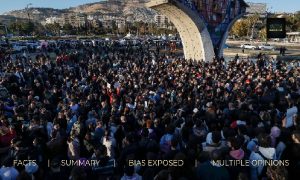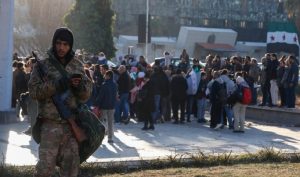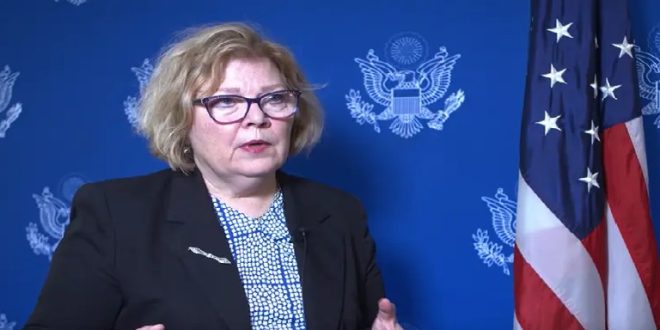21-12-2024
DAMASCUS/ WASHINGTON: US diplomats are in the Syrian capital Damascus where they plan to meet representatives from Hayat Tahrir al-Sham (HTS), the group now in charge but which Washington still designates as a terrorist organization.
The visit follows those of delegations in recent days from the UN and other countries including the UK, France and Germany.
 This is the first formal American diplomatic appearance in Damascus in more than a decade.
This is the first formal American diplomatic appearance in Damascus in more than a decade.
It is a further sign of the dramatic shifts under way in Syria since the fall of the President Bashar al-Assad’s regime more than a week ago, and the speed of efforts by the US and Europe, also leaning on Arab countries, to try to influence its emerging governance. The delegation of senior officials includes Assistant Secretary of State Barbara Leaf, Roger Carstens, who is US President Joe Biden’s hostage envoy and Daniel Rubinstein, senior adviser in the Bureau of Near East Affairs.
“They will be engaging directly with the Syrian people, including members of civil society, activists, members of different communities, and other Syrian voices about their vision for the future of their country and how the United States can help support them,” a State Department spokesperson said in a statement.
They plan to meet representatives from HTS, in a show of readiness to deal with the group the US still designates as a terrorist organization, but building pressure for it to transition to inclusive, non-sectarian government.
Washington is effectively laying down a set of conditions before it would consider delisting the group, a critical step which could help ease the path towards sanctions relief that Damascus desperately needs.
The officials are seeking further information to help find the American journalist Austin Tice, who was abducted in Damascus in 2012.
Meanwhile, as the new Syria struggles to take shape, old threats are re-emerging.
 The chaos since the overthrow of Bashar al-Assad is “paving the way” for the so-called Islamic State (IS) to make a comeback, according to a leading Kurdish commander who helped defeat the jihadist group in Syria in 2019. He says the comeback has already begun.
The chaos since the overthrow of Bashar al-Assad is “paving the way” for the so-called Islamic State (IS) to make a comeback, according to a leading Kurdish commander who helped defeat the jihadist group in Syria in 2019. He says the comeback has already begun.
“Activity by Daesh [IS] has increased significantly, and the danger of a resurgence had doubled’, according to General Mazloum Abdi, commander of the Syrian Democratic Forces (SDF), a mainly Kurdish militia alliance backed by the US. “They now have more capabilities and more opportunities.”
He says that IS militants have seized some arms and ammunition left behind by Syrian regime troops, according to intelligence reports.
And he warns there is “a real threat” that the militants will try to break into SDF-run prisons here in north-east Syria, which are holding about 10,000 of their men. The SDF is also holding about 50,000 of their family members in camps.
Our interview with the general was late at night, at a location we can’t disclose.
He welcomed the fall of the Assad regime which detained him four times. But he looked weary and admitted to frustration at the prospect of fighting old battles once again.
“We fought against them [IS] and paid 12,000 souls,” he said, referring to the SDF’s losses. “I think at some level we will have to go back to where we were before.”
The risk of an IS resurgence is heightened, he says, because the SDF is coming under increasing attacks from neighboring Turkey and rebel factions it supports and must divert some fighters to that battle. He tells us the SDF has had to stop counter terrorism operations against IS, and hundreds of prison guards from a force of thousands have returned home to defend their villages. (Int’l News Desk)
 Pressmediaofindia
Pressmediaofindia




